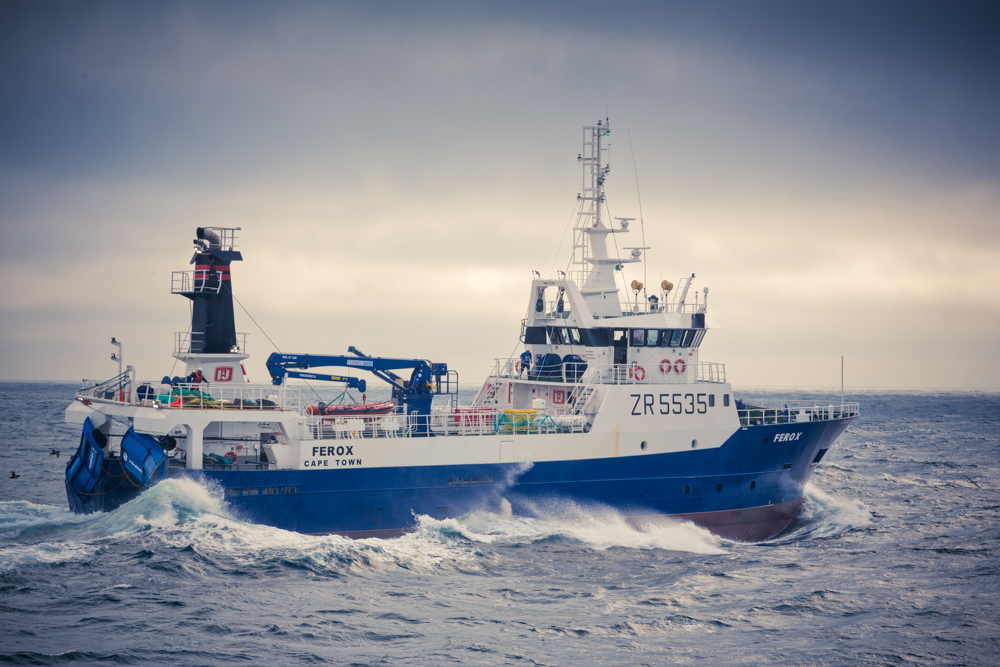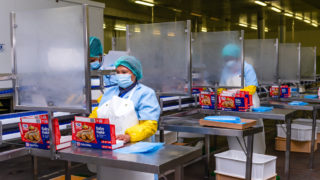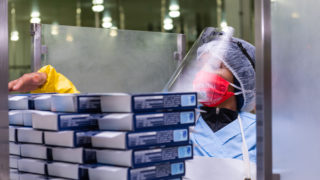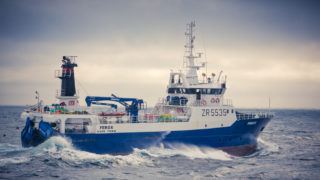MEDIA RELEASE
New five-year certification for SA’s most sustainable fishery
After an exacting 12-month re-assessment, the South African hake trawl fishery has been certified “sustainable” by the Marine Stewardship Council (MSC) for a fourth five-year period.
The MSC is an independent non-profit organisation that sets a standard for sustainable fishing and uses an ecolabel to recognise and reward fisheries that meet the standard. The MSC standard is rigorous and takes into account the entire fishery and the ecosystem on which it depends.
“The South African hake trawl fishery was the first hake fishery in the world to be certified by the MSC,” said Felix Ratheb, chairman of the South African Deep-Sea Trawling Industry Association (SADSTIA) and chief executive of Sea Harvest. “The fact that the South African hake trawl fishery has retained this prestigious certification for 16 years speaks to an enduring partnership between industry and the Department of Environment, Forestry and Fisheries, the industry regulator, and academic institutions like the University of Cape Town.”
The trawl fishery delivers hake to fish & chip shops in every corner of South Africa; processes and packages fish fingers and other popular hake products for local supermarkets; and also supplies a demanding international market with a range of value-added hake products.
Sue Middleton, acting deputy director general in the Department of Environment, Forestry and Fisheries (DEFF) commented:
“The DEFF’s Fisheries Management branch is one of the stakeholders involved in the re-certification of South Africa’s deep-water hake fishery by the MSC. The branch is proud to support this certification that promotes sustainable fishing practices in our fishery, including ecolabelling and protecting our ocean’s habitats.”
Approximately 67% of hake caught by the 32 members of SADSTIA is exported and MSC certification is vital to the international competitiveness of the fishery.
“In northern European countries like Germany, Holland and Sweden, as well as in Australia, the United States and the UK, there is a high degree of consumer awareness of seafood sustainability. Customers in these countries demand seafood products that can be traced to a sustainable source and this is exactly what our industry is able to deliver,” explained Ratheb. “MSC certification is vital to our export business and to the success of our fishery.”
The deep-sea trawling industry catches approximately 120 000 tons of fish per year and is by far South Africa’s most valuable fishery, generating sales of R4.5 billion per year and making a total annual socio-economic contribution of R6.7 billion. The industry employs approximately 7 300 South Africans in direct jobs and at least another 20 000 people in indirect jobs. Rights are held by 32 companies which range in size from large, vertically integrated firms to small- and medium-sized enterprises with diversified operations. Together these companies are 66.6% black-owned.
“Because it is sustainable and well-managed, the hake trawl fishery will continue to deliver these benefits to the people of South Africa for generations to come,” said Ratheb.
In certifying the South African hake trawl fishery, the MSC determined:
- Hake stocks are well monitored and in a good state.
- The fishery’s impact on the environment is managed effectively.
- The fishery is managed under South African legislation which meets the requirements of international conventions.
- The fishing fleet is limited in size and all vessels are subject to quotas and limits on their activities.
“Congratulations to the South African hake trawl fishery on their fourth successful certification against MSC’s framework for fisheries sustainability,” said Michael Marriott, MSC program manager for Africa, Middle East and South Asia. “The MSC Standard is regularly updated to reflect current scientific understanding on what it means to be sustainable, and for 16 years the South African hake trawl fishery has played a leading role in working with NGOs, scientists and government to ensure the long-term future of the hake resource. They continue to contribute to research and to improve their operations in their efforts to achieve best practice.”
The South African hake trawl fishery is one of 409 fisheries around the world that have been certified to the MSC’s sustainability standard, with another 89 undergoing assessment. Fisheries representing more than 15% of the world’s wild marine catch are engaged in the MSC certification programme and more than 18 000 MSC products are available across the globe.
Read more about the MSC certification.
Attached are photographs typical of the catching and processing of South African hake.
ISSUED BY THE SOUTH AFRICAN DEEP-SEA TRAWLING INDUSTRY ASSOCIATION
15 February 2021
For more information please contact:
- Claire Ward, SADSTIA communications
Email: [email protected]
Tel: 083 290 7995
- Felix Ratheb, chairman of SADSTIA
Email: [email protected]
Tel: 082 496 3419
Brandstories Disclaimer:
Brandstories is not liable for the contents of the information published on this platform. The information which subscribers publish on this website is for general information purposes only and Brandstories facilitates the ability for viewers and subscribers to access this platform. Subscribers who publish their content on Brandstories are held responsible for their own content. This includes ensuring that it is factually accurate, grammatically correct, free of spelling errors, and does not contain unsavoury content that could result in legal action. In the case of linguistic translations, the onus is on the client to ensure that the translation is accurate. In no event does Brandstories make representations or warranties of any kind, expressed or implied about the completeness, accuracy, reliability, suitability or availability with respect to the information supplied and published. This website includes links to other websites, including third party websites. Brandstories does not recommend, endorse or support any views that are held by subscribers publishing information, and within these links provided. Furthermore, Brandstories does not have control over the nature, contents and availability of information contained on these sites. Any form of reliance readers and consumers may place on information published on Brandstories is strictly at their own risk. Brandstories makes every effort to ensure that the website is up and running smoothly at all times, however Brandstories does not take responsibility for, and will not be held liable for times when the website is temporarily unavailable due to technical glitches that are beyond our control.
You may also like
-
Tulela Safari Lodge Redefines the Modern Safari Experience
-
SLAM Acquires 51% Stake in Academia – Stellenbosch’s Flagship Student Residence
-
The Mask That Thinks It’s a Scuba Diver
-
Top 10 Restaurants In Skiathos 2025:The Delicious Art of Wandering
-
32-year-old energy CFO inspires rising stars at Youth Energy Summit 2025




